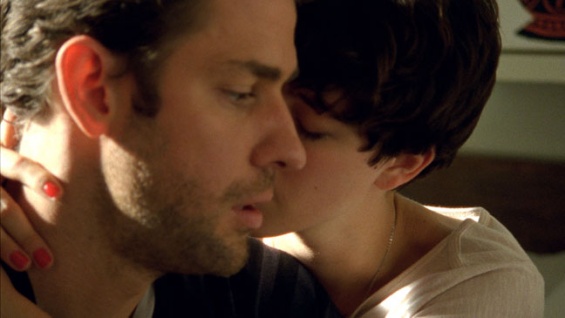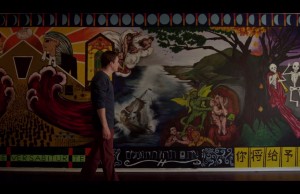“Nobody Walks” Is Unstructured And Underdeveloped


Martine (Thirlby) and Peter (Kransinski) contemplate romantic involvement. (Courtesy of Magnolia Pictures)
“Nobody Walks,” a title that refers to the notion that in Los Angeles most inhabitants drive from locale to locale rather than move with their God-given mode of transport, is the third film from independent director, Ry Russo-Young.
Previously, Russo-Young directed the dramas “Orphans” and “You Wont Miss Me,” in 2007 and 2009 respectively.
Broadly described as an experimental, unconventional filmmaker, Russo-Young has received generally favorable praise thus far in her young career. Easily the most mainstream and expensive film in her filmography, “Nobody Walks” was developed through the Sundance Institute Screenwriters Lab. This five day writer’s workshop offers independent filmmakers the opportunity to thoroughly work on their projects with the added assistance of proven industry professionals. The Sundance “boot-camp” allowed Russo-Young to partner with another promising young creative, Lena Dunham, on the script. Dunham, who’s 2010 film “Tiny Furniture” garnered much critical praise and lead to the HBO series “Girls,” has a fair amount of experience developing emotionally rich, complex female characters. And the protagonist of “Nobody Walks,” Martine, certainly fits that description.
The movie begins as Martine, played by Olivia Thirlby, an aspiring New York-based filmmaker, travels to Los Angeles to work with a friend’s associate on the sound design of her new gallery piece. This sound effects expert is the married Peter, interestingly performed by The Office’s John Krasinski, who almost instantaneously becomes infatuated with his guest’s sexual lure and artistic talents. From here, we observe the progress of their conspicuous relationship and the effect it has on Peter’s marriage to his wife, Julie (Rosemarie DeWitt).
Though the film is mainly centered on Martine, the short running time is truly a collection of relational experiences that several different characters undergo. Each character’s perspective is used to demonstrate love and its complexities at different stages of life. For instance, Russo-Young and Dunham blend the emotional struggle of the sixteen-year-old Kolt (India Ennenga) with that of her mother’s therapy patient, Billy (Jeremy Kirk).
The reason why the creative team behind the film chose to showcase multiple characters’ conflicting, romantic feelings is completely understandable and in all likelihood, the proper thematic choice. By deciding to focus on several points of view, Russo-Young needed to allot each story the screen time to fully develop. However, with only 83 minutes to ration, each narrative gets shortchanged. No character is clearly defined or described, their motives are never truly explained, and the consequences of their actions only briefly shown. Perhaps Russo-Young and Dunham would have been better suited to only concentrate on intricately forming Martine’s character arc, and from her transformation branch out to the portraits of other characters. Clearly Martine is the most interesting character to both the viewer and the other players in the film, so additionally conceptualizing her story would have greatly benefited the emotional impact of the cinematic experience.
Even with poorly defined characters, the performances of every actor comes across as natural and honestly realistic. After you attribute the almost contradictive nature of Martine’s actions to only the script, Thirlby’s performance becomes complex and occasionally alluring. It was also surprisingly pleasant to observe Krasinski in a much more dramatic role, despite the poor structure of his character.
The aesthetics of “Nobody Walks” are also quite pleasing and captivating. Featuring some excellent cinematography by Christopher Blauvelt and an ambient, atmospheric score by the musical duo Fall On Your Sword, the audible and visual presentation of the film helps compensate for the poor plot and character development. Yet, it seemed Russo-Young and her editors preferred to feature montage sequences of landscapes with neat music, over scenes that would add to the unstructured, underwhelming plot.
In the end, “Nobody Walks” can be categorized as an interesting independent film that attempts to express some complex and heartfelt themes. It’s never boring or traditional, but it never quite reaches the level of impact Russo-Young and Dunham likely hoped for.
“Nobody Walks” will be released in theaters on Oct. 19.
Read more from Alex Kutulos here.
Reach Reporter Alex Kutulos here.
Trailer:



